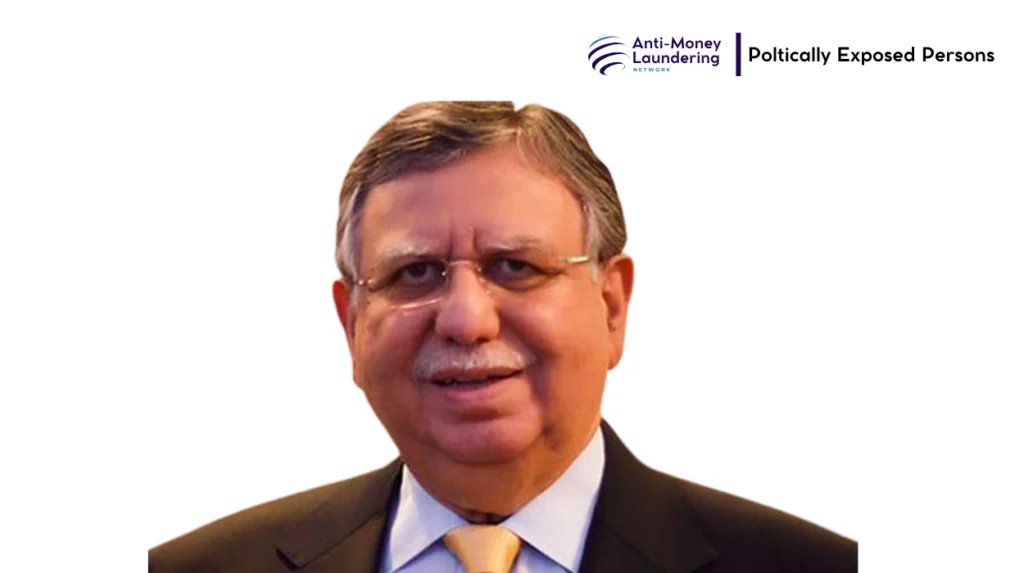Shaukat Tarin, also known as Shaukat Fayyaz Ahmed Tareen, is a prominent Pakistani banker and politician widely recognized for his multiple tenures as the Minister of Finance in Pakistan. With a career spanning over four decades, he has significantly influenced Pakistan’s economic landscape. His role in financial policymaking and banking reforms places him among the few figures pivotal to Pakistan’s contemporary fiscal history. Despite his accomplishments, Shaukat Tarin has also been scrutinized concerning financial transparency, especially as a Politically Exposed Person (PEP) linked to offshore companies and banking conflicts of interest.
Early Life and Background
Born on January 1, 1953, in the historic city of Multan, Pakistan—known as the City of Saints—Shaukat Tarin came from a family with a professional background, his father being an army doctor. He pursued higher education at the University of Punjab, where he earned a master’s degree in business administration, majoring in finance. This strong academic foundation set the stage for his long banking career. Details regarding Shaukat Tarin’s education highlight his early exposure to financial systems, which was instrumental in shaping his later career in both banking and politics.
Personal Life
The Shaukat Tarin family is comparatively private, although some details are public. He is married, and his spouse remains relatively unknown in public discourse, consistent with Pakistani political figures’ preference for privacy in personal matters. He has children, including a daughter, but detailed public information about his children and other family members is limited. His brother is occasionally mentioned in political contexts but without much public focus. The family’s financial and political activities have been part of investigations, particularly concerning offshore holdings.
Career and Achievements
Before entering politics, Shaukat Tarin had a distinguished banking career. He began as a trainee at Citibank in 1975 and climbed the ranks to serve as the country manager for Citibank Pakistan and Thailand. Additionally, he held senior leadership roles, including heading Habib Bank, Union Bank, and chairing the Karachi Stock Exchange twice.
His transition to formal politics began with his appointment as an adviser to the finance ministry in 2008, continuing into his first term as the Minister of Finance in Pakistan from 2008 to 2010 under the Pakistan People’s Party (PPP). During this period, he played a crucial role in securing a $5 billion bailout package from the International Monetary Fund, which helped stabilize Pakistan’s economy amid a looming default crisis.
In 2021, Shaukat Tarin was reappointed as Finance Minister under Prime Minister Imran Khan’s Pakistan Tehreek-e-Insaf (PTI) government, serving until his resignation in 2023 citing health and financial challenges. Throughout his political career, he was notable for his technocratic approach to economic challenges, helping implement reforms designed to spur economic growth and improve fiscal management.
Importantly, alongside his ministerial roles, Shaukat Tarin continued his association with banking institutions, notably Silk Bank, where he served on the board. His ties to Silk Bank led to accusations of conflict of interest, compelling him to resign in 2010 from his ministerial role to pursue equity raising for the bank. This dual role has attracted criticism and questions about governance ethics.
Lifestyle and Wealth
While specifics about Shaukat Tarin’s net worth remain opaque, indications are that he amassed substantial wealth commensurate with his extensive banking career and political influence. There is no public evidence of extravagant lifestyles such as palaces or yachts commonly associated with political elites; however, his financial dealings, particularly his offshore company involvements revealed in the Pandora Papers, have fueled speculation regarding his personal wealth management strategies.
The Pandora Papers disclosed that Shaukat Tarin and family members owned several offshore companies set up in connection with fundraising activities related to the Silk Bank. Though these companies were reportedly dormant and did not conduct transactions, the formation of offshore entities by a senior finance official prompted concerns regarding transparency and asset concealment.
Influence, Legacy, and Global Recognition
Shaukat Tarin’s legacy in Pakistan’s economic governance is multifaceted. On one hand, he is credited with averting economic crises, enhancing banking sector stability, and negotiating critical international financial arrangements. His role in stabilizing Pakistan’s economy during challenging periods, including managing IMF negotiations, has earned him recognition in global economic circles.
Conversely, his career illustrates the complex intersection of politics and business in Pakistan. His involvement in both public office and private banking connotes the blurred boundaries that many political figures navigate, often under scrutiny for potential abuse of power or financial misconduct. This dual reality contributes to an ongoing dialogue about elite accountability in developing economies.
Financial Transparency and Global Accountability
As a Politically Exposed Person, Shaukat Tarin’s case underscores significant challenges inherent in Pakistan’s political system regarding transparency and financial accountability. The revelations through the Pandora Papers about his offshore connections highlight systemic vulnerabilities, where PEPs exploit their positions to create opacity around wealth accumulation.
Despite allegations, no formal sanctions or legal proceedings have decisively implicated him in wrongdoing, reflecting Pakistan’s broader struggles with enforcing regulations on political elites. His situation exemplifies how the political system often shields powerful individuals, undermining efforts to combat money laundering and illicit financial flows.
The case raises critical questions about governance norms in Pakistan and the need for strengthened global financial oversight mechanisms to hold politically exposed persons to higher standards of accountability. It is a reminder of the intricate linkages between economic policymaking, elite networks, and financial secrecy.
Shaukat Tarin remains a prominent figure in Pakistan’s political and banking spheres. His career illustrates the impact a seasoned technocrat can have on a nation’s financial stability and policy direction. At the same time, his offshore dealings and potential conflicts of interest reflect enduring challenges within Pakistan’s governance structures concerning transparency and ethical conduct.
In sum, Shaukat Tarin embodies the complexities of leadership in emerging economies where significant achievements coexist with unresolved questions about financial propriety. His influence, legacy, and the controversies surrounding his career continue to shape debates on accountability and economic reform in Pakistan and beyond.

